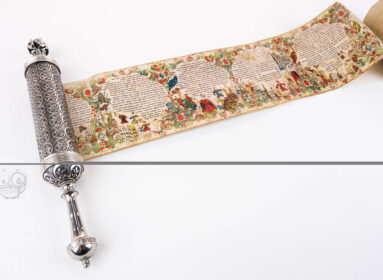
By Rabbi Tzvi Hersh Weinreb
My wife and I moved to the Jewish community of Baltimore almost 50 years ago. The fond memories we have of the time we spent there begin with our first Shabbat in town. It was then that I met two older men, at least twice my own age, at a nearby synagogue.
They told me about their encounters with the great early 20th-century sage Rabbi Yisrael Mayer Kagan, of blessed memory, the author of the famous book, Chafetz Chaim. My two friends insisted that that particular book was not his most important work. Their candidate for their mentor’s masterpiece is entitled Ahavat Chesed, “Loving Kindness,” which is about the acts that one is commanded to perform in order to assist others who are in need. A major portion of the work is dedicated to a mitzvah which is less well known, but which is promulgated in this week’s Torah portion, Mishpatim (Exodus 21:1-24:18). The following are the verses to which I refer:
“If you lend money to My people, to the poor among you, do not act toward them as a creditor; exact no interest from them. If you take your neighbor’s garment in pledge, you must return it to him before the sun sets; it is his only clothing, the sole covering for his skin. In what else shall he sleep? Therefore, if he cries out to Me, I will pay heed, for I am compassionate” (Exodus 22:24-26).
This beautiful passage portrays an act of compassion. The image of a totally destitute person who has but one change of clothing is heartrending. The sensitivity to his sleeplessness is exquisite. But there is one word that the commentators find puzzling: the first word in the passage, “If.” If you lend money to my people? Shouldn’t it read,“You must lend money to My people.”?
Rashi cites Rabbi Ishmael’s teaching in the Talmudic tractate Bava Metzia: “Every ‘if’ in the Torah expresses an act which is optional, except for three instances in which ‘if’ expresses an act which is mandatory–compulsory–and this is one of the three.” This “if” is to be translated as “you must.”
And so, why does the Torah not simply tell us that we must lend money to those who need it? Why the “if”? One answer to this question is found in the teaching of the Hasidic master Rabbi Yechezkel of Kuzmir, regarding the following Talmudic text:
“Rabbi Pinchas ben Yair was on a mission to try to redeem several Jews who were held captive. His route was blocked by the river Ginai. He said to the river, ‘Split your waters so that I might pass through!’ The river refused, saying, ‘You are on your way to do the will of your Maker, and I am on my way to do the will of my Maker. You might succeed, but you might not succeed! But I will certainly succeed! I simply need to continue to flow.’”
The river seems perfectly justified. All he has to do is follow nature’s course and flow downstream as his Maker created him to do. But Rabbi Pinchas could not be certain of success. Indeed, the odds are that he would fail. Why should the river yield?
Rabbi Pinchas ignored the river’s reasonable argument. Instead, he threatened the river, saying, “If you don’t split for me, I will decree that not a drop of water shall ever again flow down your riverbed for all eternity!”
What right did the rabbi have to ignore the river’s argument? Rabbi Yechezkel of Kuzmir answers: The river’s assumption is that a deed that is certain to be successful is more desirable to the Almighty than is a deed whose ultimate success is in doubt. Rabbi Pinchas taught him otherwise. The Almighty cherishes the person who undertakes a mission which is risky and whose outcome is uncertain much more than the person who undertakes a mission which he knows will be blessed with success.
This, I would suggest, is why lending money to someone in need is, at least in one way, more desirable to the Almighty than simply giving a handout to the poor. When one gives food, for example, to a hungry person, he knows immediately that he has done a good deed. There is no element of doubt. However, when one lends money to another, one never knows. Will the borrower postpone repayment? Will he default? It is a mitzvah done in the throes of doubt and uncertainty. The lesson taught by Rabbi Pinchas teaches the lender that the mitzvah he did with so much doubt and uncertainty is all the more cherished by the Almighty.
There are many mitzvah missions that we all undertake at great risks and with no guarantee that we will be successful in our efforts. Rabbi Pinchas ben Yair teaches us to deliberately pursue such mitzvot.
Hence, the passage in this week’s Torah portion begins with the big “if.” Moral actions are often “iffy.” But that’s all the more reason to engage in them. The risks are real, but the rewards are eternal.
Rabbi Tzvi Hersh Weinreb is the executive vice president, emeritus of the Orthodox Union.







 Southern New England Jewish Ledger
Southern New England Jewish Ledger













